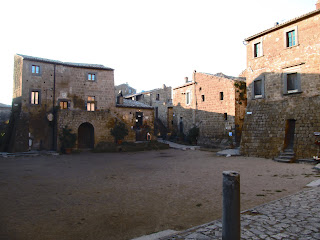We have only a precious few days remaining here in Orvieto and the weather has been so kind to us that it seems a shame to remain indoors drinking coffee, eating pastries and reading, those being some of our favourite things to do, admittedly. I had been reading about a little town called Bagnoregio, which is pretty and old and despite having those features alone to recommend it, is more of a drawcard by virtue of its connection by footbridge to an even-smaller tiny wee village called Civita. The bus ride cost a mere two euros and took 55 minutes to its destination. We alighted in Bagnoregio and walked through the town and out the other side, to reach Civita.
Unfortunately, our camera is inadequate to take a good photo of the approach to Civita from Bagnoregio, so I have included this shot from the internet which may have been taken from a helicopter of what has been called "the umbilical bridge that connects Civita with ... the rest of Italy."
Despite appearance, it is not snow that can be seen in the photo below of the valleys around the rock, but volcanic earth. How desolate and stark it looks.
Civita was founded way way back, in about 500 BC by the Etruscans on a volcanic outcrop and that rocky monolith is surrounded by stunningly picturesque valleys. Due to erosion, massive pieces of the volcanic tufa have fallen away from the main area over the centuries, leaving Civita as a virtual "island", now reachable only by the footbridge. It is known as a "dying city" because at some time in the future, the erosion will result in Civita's complete destruction, but in the meantime there are a few bars, art studios, a large church (of course) and various knick-knack shops; twice each year a festival called Palio della Tonno is held in the town, culminating in a donkey race in the main piazza. I'd love to see that.
We heard different reports of how many people actually live in Civita, but regardless of which story you listen to, you can count the number of residents on your fingers and toes. Apparently, in the warmer months, a lot of tourists do visit, but when we were there yesterday there were only about 12 people visiting (including us) and as we drank our beer at an outdoor cafe, we waited for the tumbleweeds to roll through.
D1
We heard different reports of how many people actually live in Civita, but regardless of which story you listen to, you can count the number of residents on your fingers and toes. Apparently, in the warmer months, a lot of tourists do visit, but when we were there yesterday there were only about 12 people visiting (including us) and as we drank our beer at an outdoor cafe, we waited for the tumbleweeds to roll through.
D1






No comments:
Post a Comment